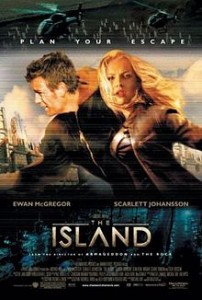 You know, I’ve often mentioned how I write like Michael Bay directs. For better or worse, that’s the style I’ve become comfortable with. It’s something I enjoy. Ever since I started going to the movies, I’ve always made it a point to go seek out the big summer blockbusters. I’ve always enjoyed the ones whose production costs often top out at more money than you or I will ever see in our lifetime. I don’t think I can ever recall thinking to myself: “Hm. The trailer makes this movie look like a scintillating metaphor for the human condition. I -MUST- see this.”
You know, I’ve often mentioned how I write like Michael Bay directs. For better or worse, that’s the style I’ve become comfortable with. It’s something I enjoy. Ever since I started going to the movies, I’ve always made it a point to go seek out the big summer blockbusters. I’ve always enjoyed the ones whose production costs often top out at more money than you or I will ever see in our lifetime. I don’t think I can ever recall thinking to myself: “Hm. The trailer makes this movie look like a scintillating metaphor for the human condition. I -MUST- see this.”
But I believe it can be said that even Michael Bay in his most basic form studies the human condition. His characters usually tow the line around everyman style characters, or even those that just don’t fit in. His characters are human. They are you or me. And they are in way over their heads. And when you can see these characters rise up to meet the often over-the-top challenges, the story they tell is almost one of inspiration.
But at the end of the day, it’s still a formula for good storytelling.
From Indiana Jones to Bad Boys, Michael Bay seems to have played a huge role in my popcorn intake. And that’s the story I’m going to tell today.
Popcorn movies are derided for their simplistic plotlines, their gratuitous violence, and frequent hammy or poor acting. But, such is the nature of the beast. And I love every minute of it. To me, Michael Bay is to cinema what Lester Dent was to the pulps. There’s something about the rhythm and cadence of his films. Everything builds nicely into one giant crescendo of brilliantly twinkling broken glass. It’s violently beautiful. The man is the best hack in the business. And you know what, he just doesn’t give a damn.
To me, books are entertainment. They are films that play out in the theater of your mind. And the entirety of the purpose if entertainment is – well – to entertain. To turn off that critically analytical part of your brain and just enjoy the ride.
The Island stars Ewan McGregor as Lincoln Six Echo, a man who clearly doesn’t fit in. From the opening moments of the film, you can see just how out of place he is living in this utopian society. From the moment he wakes up to the flashing LED displays warning of an irregular sleep cycle, to the analyzation of his urine while he is in the bathroom. It’s a strange world that plays out perfectly from a visual standpoint as white track-suited people mill about in perfect harmony while black suited controllers watch their every move.
The residents of the compound live and hope for “the lottery” so that they can be transported to the Island, a tranquil place known as the last bastion of humanity after a deadly contamination wiped out most of the habitable world.
The kicker of course, is that there was no contamination. The perfectly picturesque island they see the vision of every day is no more than an illusion. The world still lives and breathes as it ever did. The residents are no more than fleshbags holding valuable organs. Each time the “lottery” is drawn, another angel gets its wings. Lincoln Six Echo, in a beautifully filmed discovery finds a moth flying inside the secure compound. If the moth is alive, then surely the world must be.
This sets off a high octane action-adventure in which Lincoln Six Echo breaks free from the compound and meets the real Lincoln, who turns out to be a perfect caricature of everything that’s wrong with people. The man is greedy, conniving, and manipulative. While the clone is kind-hearted and world-wizened.
Oh. And there’s explosions too. Explosions that would make Mr. Torgue very happy.
In truth, The Island blew my mind for the first time in recent memory. And I think all of the pastiches and cliches of a science fiction film or story, if let out of the care of Michael Bay’s watchful eye would have fallen flat. It’s in the way he captures a single moment in time that really just — evokes the perfect image of a world gone.
So. What can you learn from this or any of Michael Bay’s films as a writer?
Entertainment, in its most basic form exists for one purpose: To entertain. If a film or a book can function on its own basic structure as means of entertainment, then whatever message or theme you desire can be threaded through the needle.
Visualization is key. Study a frame, a scene, a moment in time to learn the subtle nuances and help you capture the perfect image.
Don’t be afraid of the critics. They exist to criticize.
Don’t be afraid to show the little things in life. If your characters are human or cyborg or even alien, they all have feelings, quirks, and things that just make them who they are. Let them shine.
